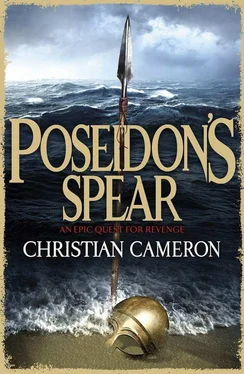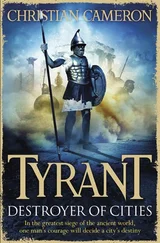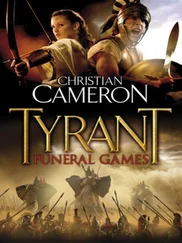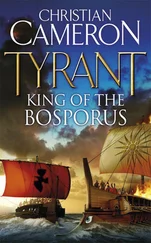Christian Cameron - Poseidon's Spear
Здесь есть возможность читать онлайн «Christian Cameron - Poseidon's Spear» весь текст электронной книги совершенно бесплатно (целиком полную версию без сокращений). В некоторых случаях можно слушать аудио, скачать через торрент в формате fb2 и присутствует краткое содержание. Жанр: Исторические приключения, на английском языке. Описание произведения, (предисловие) а так же отзывы посетителей доступны на портале библиотеки ЛибКат.
- Название:Poseidon's Spear
- Автор:
- Жанр:
- Год:неизвестен
- ISBN:нет данных
- Рейтинг книги:5 / 5. Голосов: 1
-
Избранное:Добавить в избранное
- Отзывы:
-
Ваша оценка:
- 100
- 1
- 2
- 3
- 4
- 5
Poseidon's Spear: краткое содержание, описание и аннотация
Предлагаем к чтению аннотацию, описание, краткое содержание или предисловие (зависит от того, что написал сам автор книги «Poseidon's Spear»). Если вы не нашли необходимую информацию о книге — напишите в комментариях, мы постараемся отыскать её.
Poseidon's Spear — читать онлайн бесплатно полную книгу (весь текст) целиком
Ниже представлен текст книги, разбитый по страницам. Система сохранения места последней прочитанной страницы, позволяет с удобством читать онлайн бесплатно книгу «Poseidon's Spear», без необходимости каждый раз заново искать на чём Вы остановились. Поставьте закладку, и сможете в любой момент перейти на страницу, на которой закончили чтение.
Интервал:
Закладка:
The hull bumped the wharf.
The trierarch had the gangplank rigged, and then he, his two helmsmen and the oar-master walked off the ship. An hour later, after we’d grilled in the African sun, twenty soldiers — Poieni, which is their word for citizen infantry, like our hoplites — came to the ship and ordered us off. Many of us could not walk.
The phylarch shook his head. ‘Useless fuck. These men are ruined.’ He spat. Came and looked at me. He pointed at my legs.
My once-mighty legs were like sticks.
‘Look at this one,’ he said. ‘Good-size man. Filthy, lice, and hasn’t been allowed exercise.’ He shook his head. ‘Hasdrubal is a useless fool. Sell this lot to anyone who will take them.’
And with that, he took the surviving women and marched them away. That left another man in charge, and he averted his eyes and his nose and ordered those of us who could walk to carry the rest. I ended up carrying the Illyrian. I have been back to that spot — we only walked about fifty horse-lengths. Less than a stade.
I remember it as being more like fifty stades. It went on for ever. Oddly, they never struck us, and one of the Poieni asked us why we were so silent.
No one spoke.
We were put in stone slave pens with a roof and shade. There was water in which to bathe, drinking water and a shit-hole. I saw men break there — men who had been free and were now slaves.
But for us, fresh from Hasdrubal’s grim trireme, it was like the Elysian Fields. We had barley porridge for dinner and again at breakfast, and red wine so thin it was like water. It made me drunk, so I laughed and sang the Paean of Apollo. I was the first to give way to sound. After a second helping of that awful wine, a dozen men were grunting at my song. Or my attempt at song.
We passed out. But in the morning, I found that the Illyrian was curled tight against me, and the Greek, Nestor, was lying against the wall with the Thracian.
Nestor looked me in the eye. ‘We lived,’ he said quietly.
The Thracian grunted.
‘Now,’ I said, ‘we need to get free.’
Both men nodded.
And the Illyrian stiffened. ‘ Eleuthera,’ he said. Freedom.
Free. That’s what we thought.
2
My Illyrian’s name was Neoptolymos. He considered himself a direct descendant of Achilles, and he was willing to kill every man who had even seen him enslaved. His humiliation had almost broken him. But after two days in Carthage, he joined me for my morning prayer to Apollo — in awful Greek — and we began to talk.
We were allowed to talk, in Carthage. Talk, and eat. They fattened us up for about a week. We got cheap pork sausage with bread in it and green stuff — I still hate cheap pork sausage. They gave it to us three times a day, and took us out in a tiny yard for exercise, where we had to leap and jump and do foolish antics — stupid stuff that any gymnasium would have frowned on.
I knew how to condition myself, so I did proper exercises whenever I could, and taught them to my companions. The guards didn’t care.
A little at a time, I put some of the moves of pankration into my callisthenics. They gave me weights. I boxed with my shadow. The guards took an interest, but not much of one, and it was a small rebellion — the kind that means a great deal to the morale of a slave.
And that was a good thing, because eight days after we landed, Dagon came into our exercise yard and ordered us to be marched to a ship.
It still seems incredible to me that we could have gotten him again. Perhaps his deep — well, I’ll call it a sickness for lack of a better word, though I think he was cursed by the gods for something — at any rate, his sickness drove him to want to torment us. Again. It’s the only rational explanation why he, an officer, wanted the same broken men he’d just brought in.
We were marched through the streets, surrounded by guards. Dagon took all eighty of the survivors, and we were added to a hundred fresh slaves — Sikels, recently taken in war, who spoke little Greek and had never pulled an oar.
As we walked through the darkened streets of Carthage, Dagon walked by me. He didn’t say anything at all. He just smiled at me, and rubbed the butt of his thonged whip against my thighs and arse like a caress. Still makes me shudder.
And then he hit me with the whip — the butt, not the thongs — across the temple.
And when I kept pace and didn’t scream, he laughed.
I think the Sikels saved my life. Because they were so bloody awful that Dagon never had a chance at me those first two weeks at sea. He beat them raw, and they still couldn’t — and wouldn’t — row. He killed a pair who he said were fomenting mutiny, and they killed one of his bully-boys in the dark.
We were ten days out, somewhere on the deep blue north of Africa and south of Sicily, and the sun was a relentless foe, an aspis of fire slamming into our heads and backs. The ship stank of excrement and sweat and fear. The masts were stowed, there wasn’t a breath of wind and sweat ran straight down my chest and into my groin to drip onto the man below — I say below, because after eight days at sea, I was a top-deck oar.
We all knew that Kritias was dead and over the side, slain in the dark, and the Sikels were waiting to see what Dagon would do.
As luck would have it, I was across the bench from Neoptolymos, who was on the port side while I was on the starboard. Skethes and Nestor — both, by the standards of our new ship, the Baal Shamra, expert oarsmen — sat several benches behind us, but together. I’d managed to exchange a long look with Skethes. Slaves can communicate a great deal in a look. And we’d learned to tap on the wood of our benches. We had a few rhythms — nothing like communication, but it could convey simple messages. My look said: ‘I’m alert and ready’. His said: ‘Me too’. My taps said: ‘Be ready’.
Watch your slaves sometime, honey. They have many ways to communicate.
We pulled. The rowers were tired, but not exhausted, and we hadn’t been fed. I had a feeling that the bullies were arming in the stern behind me, although I couldn’t see them.
And then Dagon was standing beside me. He was in bronze — a good breastplate, a heavy helmet. He put the point of a spear at my back. It was very sharp.
‘I don’t want you to die easily, lover,’ he said with his usual smile. ‘But if you move, I kill you.’
Suddenly, there were screams.
The Sikels rose off their benches.
And died.
Seven men in armour were more than a match for seventy naked, tired men without even the shafts of their oars. I know. I’ve done it myself.
The Sikels fought hard for a few minutes, while we, on the upper tier, sat silently. Dagon was behind me and above me on the catwalk — there was no combination of moves that would allow me to rise off my bench and trip him. I considered it, anyway.
If the Sikels failed, I knew my life would become much, much worse, because Dagon would have no distraction from me. And because eighty of us — his ‘survivors’ — would have to row the pig of the ship, laden with African iron ore.
About the time the Sikels began to give way to despair, I decided that my life wasn’t worth an obol. I thought of the Keltoi woman. There just comes a point where either you submit and become an object, not a person, or you break and go mad. Or you fight.
Or die. Or both.
I gave a great shout. Sometimes, sound can throw a man off. And I turned, trying to get an arm behind me to block his thrust.
Warned by my shout, Neoptolymos came off his bench and went for Dagon’s ankles.
As slave attacks went, it was a fine attempt. But Dagon foiled it by the simple expedient of stepping back. Then he whirled, ignoring us, and stabbed Skethes, his point in and out of the Thracian’s eye socket in a heartbeat. The Thracian fell forward, dead, his blood running out of his eye in a steady stream like wine from a wineskin.
Читать дальшеИнтервал:
Закладка:
Похожие книги на «Poseidon's Spear»
Представляем Вашему вниманию похожие книги на «Poseidon's Spear» списком для выбора. Мы отобрали схожую по названию и смыслу литературу в надежде предоставить читателям больше вариантов отыскать новые, интересные, ещё непрочитанные произведения.
Обсуждение, отзывы о книге «Poseidon's Spear» и просто собственные мнения читателей. Оставьте ваши комментарии, напишите, что Вы думаете о произведении, его смысле или главных героях. Укажите что конкретно понравилось, а что нет, и почему Вы так считаете.












